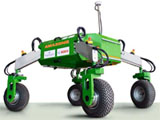Agricultural and Biological Systems Engineering, Department of

Department of Agricultural and Biological Systems Engineering: Faculty Publications
ORCID IDs
Document Type
Article
Date of this Version
2002
Citation
Proceedings of the Great Plains Soil Fertility Conference, Denver, Colorado, March 5-6, 2002, ed. Alan J. Schlegel.
Abstract
Manure, a renewable resource, is an excellent source of nutrients that can be substituted for synthetic types of fertilizers. The C in manure can enhance the physical and chemical properties of soils, especially infertile soils, as these soils typically contain low levels of organic matter and nutrients. The objective of this study was to evaluate the effects of C and nutrients in manure on soil C dynamics and crop production. The treatments included applications of site-specific manure (SSM), uniform manure (UM), uniform commercial fertilizer, and a no treatment check. Field strips 40 ft (16 corn rows) wide and 2200 ft long and under center-pivot irrigation were used in three years (1998 to 2000). For the SSM treatment, manure was applied to areas within the field where organic C was < 1.4%. Manure application resulted in significantly greater soil C level and a positive C balance in the soil. Fertilizer application resulted in negative C balance in the soil (more C lost as CO2 than added from plant biomass). Averaged across years, the UM and SSM treatments produced significantly greater grain yields and N uptakes than the commercial fertilizer treatment. Stalk N03-N concentration was less for uniform manure than fertilizer application indicating over-application of N with the fertilizer treatment. Site-specific manure application is a good method of improving less productive soils or sites within a field.

